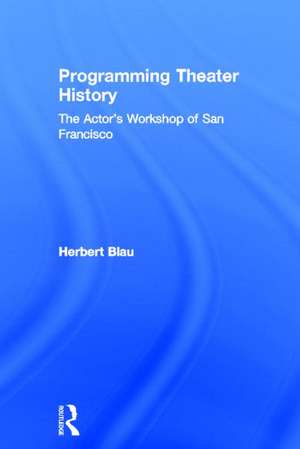Programming Theater History: The Actor's Workshop of San Francisco
Autor Herbert Blauen Limba Engleză Hardback – 12 mar 2013
Herbert Blau founded, with Jules Irving, the legendary Actor's Workshop of San Francisco, in 1952, starting with ten people in a loft above a judo academy. Over the course of the next 13 years and its hundred or so productions, it introduced American audiences to plays by Brecht, Beckett, Pinter, Genet, Arden, Fornes, and various unknown others.
Most of the productions were accompanied by a stunningly concise and often provocative programme note by Blau. These documents now comprise, within their compelling perspective, a critique of the modern theatre. They vividly reveal what these now canonical works could mean, first time round, and in the context of 1950s and 60s American culture, in the shadow of the Cold War.
Programming Theater History curates these notes, with a selection of the Workshop's incrementally artful, alluring programme covers, Blau's recollections, and evocative production photographs, into a narrative of indispensable artefacts and observations. The result is an inspiring testimony by a giant of American performance theory and practice, and a unique reflection of what it is to create theatre history in the present.
Preț: 767.38 lei
Preț vechi: 1029.27 lei
-25% Nou
Puncte Express: 1151
Preț estimativ în valută:
146.85€ • 153.13$ • 122.05£
146.85€ • 153.13$ • 122.05£
Carte tipărită la comandă
Livrare economică 21 martie-04 aprilie
Preluare comenzi: 021 569.72.76
Specificații
ISBN-13: 9780415516693
ISBN-10: 0415516692
Pagini: 224
Ilustrații: 65 halftones and 36 color halftones
Dimensiuni: 156 x 234 x 33 mm
Greutate: 0.63 kg
Ediția:New.
Editura: Taylor & Francis
Colecția Routledge
Locul publicării:Oxford, United Kingdom
ISBN-10: 0415516692
Pagini: 224
Ilustrații: 65 halftones and 36 color halftones
Dimensiuni: 156 x 234 x 33 mm
Greutate: 0.63 kg
Ediția:New.
Editura: Taylor & Francis
Colecția Routledge
Locul publicării:Oxford, United Kingdom
Cuprins
Introduction, Elin Diamond; Chapter 1 A Loft, in the Early Days; Chapter 2 Chapter 2 Coming Up the Ramp; Chapter 3 Chapter 3 Alienation and the Absurd; Chapter 4 Chapter 4 Reason Not the Need; Chapter 5 Chapter 5 Mixed Blessings and the Sorcery of Persuasion; Chapter 6 Chapter 6 Home Stretch; Chapter thewinding The Winding Sheet; Index;
Notă biografică
Herbert Blau is Byron W. and Alice L. Lockwood Professor Emeritus of the Humanities at the University of Washington, USA. He has also had a parallel career in the theater, as co-founder and co-director of The Actor's Workshop of San Francisco, then co-director of the Repertory Theater of Lincoln Center in New York, and as artistic director of the experimental group KRAKEN. His publications include The Dubious Spectacle: Extremities of Theater (2002), Nothing in Itself: Complexions of Fashion (1988), Sails of the Herring Fleet: Essays on Beckett (2004), As If: An Autobiography (Volume 1 2012), and Reality Principles: From the Absurd to the Virtual (2011).
Descriere
‘One of the great stories of the American theater..., the Workshop not only built an international reputation with its daring choice of plays and nontraditional productions, it also helped launch a movement of regional, or resident, companies that would change forever how Americans thought about and consumed theater.’ – Elin Diamond, from the Introduction
Herbert Blau founded, with Jules Irving, the legendary Actor's Workshop of San Francisco, in 1952, starting with ten people in a loft above a judo academy. Over the course of the next 13 years and its hundred or so productions, it introduced American audiences to plays by Brecht, Beckett, Pinter, Genet, Arden, Fornes, and various unknown others.
Most of the productions were accompanied by a stunningly concise and often provocative programme note by Blau. These documents now comprise, within their compelling perspective, a critique of the modern theatre. They vividly reveal what these now canonical works could mean, first time round, and in the context of 1950s and 60s American culture, in the shadow of the Cold War.
Programming Theater History curates these notes, with a selection of the Workshop's incrementally artful, alluring programme covers, Blau's recollections, and evocative production photographs, into a narrative of indispensable artefacts and observations. The result is an inspiring testimony by a giant of American performance theory and practice, and a unique reflection of what it is to create theatre history in the present.
Herbert Blau founded, with Jules Irving, the legendary Actor's Workshop of San Francisco, in 1952, starting with ten people in a loft above a judo academy. Over the course of the next 13 years and its hundred or so productions, it introduced American audiences to plays by Brecht, Beckett, Pinter, Genet, Arden, Fornes, and various unknown others.
Most of the productions were accompanied by a stunningly concise and often provocative programme note by Blau. These documents now comprise, within their compelling perspective, a critique of the modern theatre. They vividly reveal what these now canonical works could mean, first time round, and in the context of 1950s and 60s American culture, in the shadow of the Cold War.
Programming Theater History curates these notes, with a selection of the Workshop's incrementally artful, alluring programme covers, Blau's recollections, and evocative production photographs, into a narrative of indispensable artefacts and observations. The result is an inspiring testimony by a giant of American performance theory and practice, and a unique reflection of what it is to create theatre history in the present.
